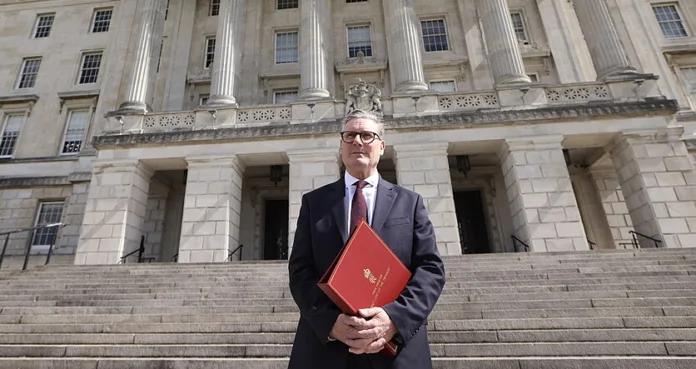Prime Minister chairs emergency Cobra meeting as police brace for more riots following Southport stabbings
Prime Minister Keir Starmer has committed to ensuring community safety amid fears of escalating riots across the UK. The pledge came after Starmer convened an emergency Cobra committee meeting on Tuesday evening—the second such meeting in as many days—addressing the intensifying disorder linked to the Southport stabbings that occurred last week.
The Prime Minister assured the public that all necessary measures are being taken to manage the unrest. “They will be safe,” Starmer declared, emphasizing that both police resources and support systems are in place to handle the situation. The escalation in disorder has prompted authorities to prepare for a potentially chaotic Wednesday, with reports indicating that at least 30 potential gatherings are being monitored. Organizers have reportedly circulated lists of solicitors and advice agencies as potential targets for these gatherings, with instructions to “mask up.”
In Belfast, unrest continued with incidents including a carjacking on Fingal Street and vandalism on Rathlin Street. The Police Service of Northern Ireland reported the arrest of three men, aged 26, 28, and 41, on charges including criminal damage. Additionally, officers are investigating an assault on a young boy as a hate crime. The boy, attacked by a group of up to ten youths, sustained minor injuries.
Meanwhile, in Liverpool and Durham, police issued dispersal orders in response to intelligence about planned disorder. In Durham, authorities ordered 37 individuals, aged between 13 and 38, to leave the city center. Despite these precautionary measures, no major disturbances or damage were reported.
In a significant legal development, Jordan Parlour became the first person convicted of inciting racial hatred during the riots. Parlour, who had posted inflammatory messages online encouraging an attack on a hotel housing asylum seekers, pleaded guilty and is awaiting sentencing on Friday.
Starmer expressed expectations for “substantive sentencing” for those involved in the unrest, emphasizing a swift legal response. Over 400 people have been arrested, with 100 charged, including some for online activities. Starmer warned that individuals engaging in or inciting disorder would face severe consequences.
The Prime Minister sidestepped comments from Elon Musk, the owner of X, who criticized the government’s handling of the unrest. Musk’s remarks suggested a disparity in how different groups are treated by the police. Starmer focused on the immediate goal of community safety and expressed support for law enforcement.
Lord Chancellor Shabana Mahmood, also the justice secretary, issued a stern warning against threats and incitement targeting legal professionals. She emphasized that those who incite violence against solicitors or their offices will face severe legal repercussions. “Inciting mobs to attack or threaten solicitors is unacceptable and those found doing so will face the full force of the law,” Mahmood stated.
Analysis
Political: Starmer’s response to the escalating unrest highlights the significant role of government leadership in managing civil disorder. The emergency Cobra meetings underscore the seriousness with which the government is addressing the situation. The Prime Minister’s efforts to ensure public safety and the swift legal actions against those involved reflect a commitment to maintaining order and upholding the rule of law. This proactive approach also serves to reinforce the government’s authority and ability to handle crises effectively.
Social: The recent unrest and subsequent government response reveal deep-seated societal tensions. The riots and disorder reflect underlying issues within communities, including grievances and social divides. Starmer’s assurances and the legal actions taken aim to restore public confidence and safety. The involvement of young people and the targeting of solicitors’ offices also highlight the social dynamics at play, where frustration and anger manifest in disruptive behaviours.
Racial: The conviction of Jordan Parlour for inciting racial hatred during the riots brings racial tensions into sharp focus. This case illustrates the intersection of racial issues with civil disorder, emphasizing the need for vigilant legal and social responses to prevent the escalation of racial animosity. The government’s handling of these issues is crucial in maintaining social cohesion and addressing the concerns of affected communities.
Gender: While the current unrest does not directly address gender issues, the broader context of civil disorder often intersects with gender dynamics. The involvement of different demographic groups in the riots and the responses from authorities may reflect varying impacts across genders, although specific gender-related aspects are not the primary focus of the current news.
Economic: The economic implications of the unrest are significant. Riots and disorder can disrupt local economies, damage property, and strain public resources. The government’s response, including increased police presence and legal measures, aims to mitigate these economic impacts. Ensuring stability and safety is crucial for economic recovery and maintaining investor and public confidence.
